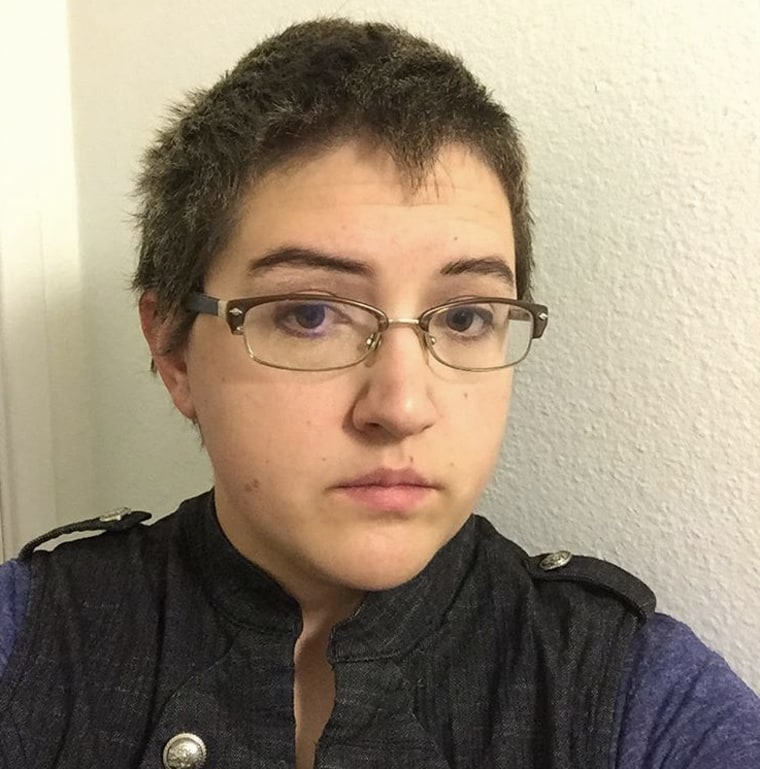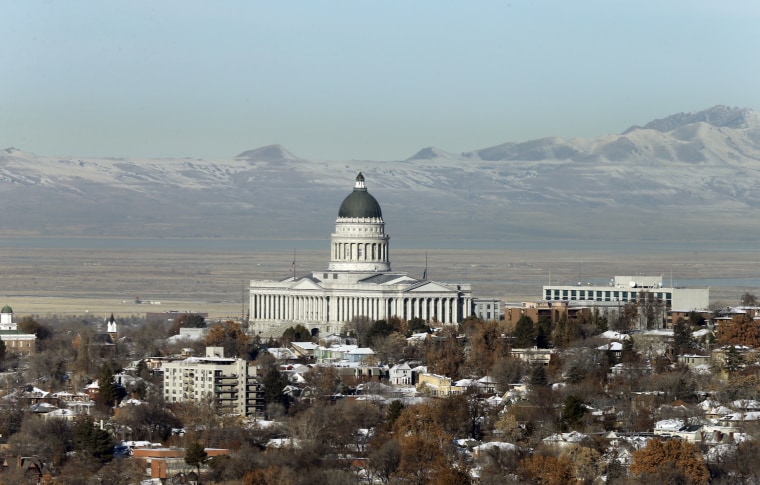Utah is among the growing number of states issuing gender-neutral IDs, but for transgender, nonbinary and intersex people, they’re still hard to get.
The state has been quietly issuing “X” markers on driver’s licenses and state-issued identification cards since last September. The same designation has been available on birth certificates since 2017. The “X” marker is a third option for those who identify as neither male nor female.
In the past five months, just two licenses have been issued without an “M” or an “F” listed on them, according to the public affairs director for the state Department of Public Safety, Marissa Cote.
“The change to allow for the X notation was made as vital records agencies and the U.S. State Department began issuing documents with that information,” Cote said in a statement to NBC News.

Utah issued its first nonbinary driver’s license to Mel Van De Graaff in September 2018, making Utah one of eight states, along with Washington, D.C., to offer a third option on driver’s licenses and state-issued ID cards. The other states include Arkansas, California, Colorado, Indiana, Maine, Minnesota and Oregon. Vermont recently announced plans to roll out a third gender option sometime this summer.
Gender-neutral birth certificates are now permitted in New York City and several states, including California, New Jersey, Oregon, Washington and Nevada (where Van De Graaff was issued theirs). The National Center for Transgender Equality includes Idaho and Montana on this list, though NBC News has not yet independently confirmed this.
The milestone in Utah went largely unnoticed by the national media. Even the Movement Advancement Project, an LGBTQ think tank that tracks changes in policy and legislation for sexual and gender minorities across the U.S., does not include Utah among its list of states with nonbinary ID options.
That may be, in part, because the policy in the state remains murky, according to Van De Graaff.
“Because it’s up to the judge, a lot of nonbinary people just don't try and get their markers changed,” De Graaff said. “A lot of them don’t have the monetary means to do so. I really believe the only reason I got mine granted was because I got an attorney, and attorneys are not cheap.”
The Utah Division of Motor Vehicles determines the gender marker listed on an applicant’s identification either by their birth certificate or a valid U.S. passport. As Cote explained, the Utah DMV’s policy “has always been to base the gender notation off of an acceptable primary identification document which includes a gender notation.”
Utah has granted just two nonbinary birth certificates since 2017, said Terry Lucherini, acting bureau director of the Utah Vital Records and Statistics. He said these documents are granted by “court order only.”
“That’s the only way we change the gender on a birth certificate,” Lucherini told NBC News.
To date, the U.S. has never issued a nonbinary passport. Because of that, trans and nonbinary people need to rely on birth certificates to update their IDs in Utah, but even getting those updated in the state can be exceedingly difficult, advocates say.
‘JUDGE ROULETTE’
When Van De Graaff started pursuing a new gender marker in November 2017, they claimed no one they knew had “heard of anybody in Utah having a gender ‘X’ license or documentation of any kind.” Van De Graaff said the common thinking was, “This can't be done, because it hasn't been done.”
Because Utah lacks a clear, statewide policy on changing one’s name and gender on vital records, like birth certificates, whether an individual successfully obtains a court order is largely up to the determination of local judges — who often vary widely in their decisions. This applies not just to those looking for a gender-neutral “X” marker, but also to those looking to update their documents from “F” to “M” or vice versa.
Two years ago, Judge Bruce C. Lubeck of Utah’s 3rd Judicial District Court reportedly told 17-year-old transgender male Lex Rigby that Lubeck could not “in good conscience” allow the gender marker on Rigby’s birth certificate to be updated from “F” to “M.” As the Utah LGBTQ publication Q Salt Lake reported at the time, Lubeck told Rigby, “I seriously hope this won’t offend you.”
Troy Williams, executive director of Equality Utah, called the situation in Utah “judge roulette.”
“If you get a friendly judge, you can get your gender marker changed,” Williams said. “If you don't, you can’t. It's fantastic that more progressive judges are issuing Xs, but for some parts of the state, that's not a possibility.”
Sue Robbins, chairwoman of Transgender Education Advocates (TEA) of Utah, said trans people often have to rely on their own informal networks to know which judges they can bring their case to and which they can’t. For instance, she claimed “a significant portion of the judges in Davis County,” which borders Salt Lake County to the north, “will not entertain” updating gender markers (even from “F” to “M” or vice versa). Judges in Weber County, just north of Davis, have also “broadly decided they won’t entertain gender marker changes.” However, she added, “I’ve never heard of a rejection within Salt Lake County.”
Even if one does find a sympathetic judge willing to update a birth certificate with a gender neutral “X,” it does not guarantee a pathway to receiving a nonbinary driver’s license. Van De Graaff said the Utah DMV finally granted their request after the issuance of a court order in March 2018. The process still took six more months while the DMV updated its system to include “X” markers.
LEGISLATIVE STALEMATE
Utah debated legislation last year that would have set in place a standard, statewide process for transgender and nonbinary people to be able to update their documentation. State Sen. Todd Weiler, a Republican, pointed to the fact that Utah’s name-change laws date to the 1950s and weren’t “originally intended” for trans people.
Weiler told The Salt Lake Tribune the decades-old laws provide “no guidance” for either transgender people or judges on how to successfully petition for a name or gender marker update.
Senate Bill 138, referred to as “Sex Change Amendments” in the text, clarified that process. It claimed that new documentation would be granted to petitioners who provide a “certified copy” of a court order to the state registrar along with their application.
In February 2018, the Utah Senate voted down Weiler’s bill, 16 to 10. Opposition was bipartisan. Democrats took issue with language forbidding trans youth from amending their name or gender until they turn 18.
“We need a uniform process for transgender folks to change their identity documents, and this is particularly important for trans youth,” Williams claimed. “If they don't have their identity documents in schools, they are at risk of being outed. There are so many dangers that a young trans child faces by not having accurate documentation.”
The state has not come closer to fixing the problem this year. The Utah Legislature weighed a bill that would block transgender people from being able to update their birth certificates — and thus, their driver’s licenses or other state-issued IDs — at all.
HB 153, called the Utah Vital Statistics Act Amendments, was pulled from consideration in February after its sponsor, Rep. Merrill Nelson, a Republican, met with trans activists who lobbied against it. Weiler withdrew his second attempt at passing the name and gender change bill the same week.
Amid a legislative stalemate, the process for receiving a nonbinary ID — or any kind of documentation that reflects a transgender person’s gender identity, even those with a binary “F” or “M” marker — remains a game of luck.
LGBTQ advocates in Utah urged lawmakers to devise a solution. After the Utah Legislature passed an LGBTQ-inclusive hate crimes bill last week, Williams said he believes further progress is coming, even in one of the country’s most conservative states.
“Lawmakers are starting to get comfortable with the ‘gay thing,’ but gender identity issues are relatively new for them, and so there's an incredible amount of education that we need to do,” he explained. “It took us seven years to pass LGBTQ nondiscrimination protections. It took us four years to pass hate crimes protections.”
In 2015, Utah became the first Republican-majority state to pass an LGBTQ nondiscrimination law. Billed as the “Utah Compromise,” it left a substantial carve out for religious entities.




